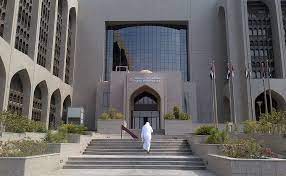The Central Bank of the UAE (CBUAE) issued its 2022 Annual Report, highlighting its progress and initiatives to bolster monetary and financial stability in the UAE throughout the year.
The report highlighted the CBUAE’s monitoring and supervision efforts to enhance monetary stability and the financial sector’s resilience and support economic activity in the UAE.
It also sheds light on economic developments observed locally, regionally, and globally throughout the year, noting that the UAE was among the world’s best-performing economies, supported by the decisions and directives of the wise leadership, as well as its undertaking of proactive measures and the reopening of the economy following the COVID-19 pandemic.
The UAE’s gross domestic product (GDP) is expected to have grown by nearly 7.6 percent in 2022, supported by significant activity across all sectors. It is among the highest globally as international markets observed a slowdown in economic growth due to increases in interest rates and geopolitical tensions.
Additionally, despite the sharp rise of inflation globally in light of the pressures on supply chains and the increase in commodity prices, inflation in the UAE remained well below the international average at 4.8 percent with an expected decline in 2023.
In light of the expected global economic downturn and a potential recession, the CBUAE, led by His Highness Sheikh Mansour bin Zayed Al Nahyan, Vice President, Deputy Prime Minister, Minister of the Presidential Court, and Chairman of the Board of Directors of the CBUAE, continued to implement macro and precautionary monetary policies. This is in keeping with the UAE government’s strategic roadmap, which looks to maintain the country’s competitiveness, ensure robust economic growth, and develop job opportunities for UAE nationals.
The report divulges the timely removal of temporary COVID-19 support measures by the CBUAE, which sought to support borrowers in combatting the negative impacts of the pandemic. The decision reflects the banking sector’s return to pre-pandemic levels of profitability and financial strength.
According to the report, the banking sector supported economic growth through private-sector lending. Banking sector assets and gross written premiums in the insurance and banking credit sector rose, while the CBUAE conducted regular asset quality assessments.
To reinforce its role as a regulator of the financial and insurance sector in the UAE, the CBUAE strengthened regulatory frameworks on licensed financial institutions (LFIs), particularly in the areas of corporate governance and risk management for insurance companies, which have contributed to the development of the regulatory environment of insurance companies and related professions operating in the UAE.
Additionally, the CBUAE carried out baseline, follow-up, and thematic risk-based reviews of LFIs to measure their financial performance and validate enhanced regulatory requirements, including but not limited to the capital, liquidity, earnings, credit quality, and control measures over service and operational resilience.
It also continued to strengthen its regulatory cooperation efforts, transparency measures, and oversight of the foreign operations of locally incorporated banks. During this time, CBUAE conducted six overseas examinations based on its risk-based supervisory plan.
The report also states that under its newly established regulatory framework, CBUAE granted licenses to specialised banks, stored value facilities, and retail payment service providers.
The report affirmed CBUAE’s success in enhancing its supervision and oversight of the insurance industry. This included integrating a digital supervisory platform into its approach, permitting centralised reporting and analysis. In 2022, insurance companies made progress in implementing more robust internal controls over their financial reporting to improve its quality.
In the area of anti-money laundering and countering the financing of terrorism (AML/CFT), CBUAE continued to adopt stringent measures, including enhancing focus on the shortcomings in anti-money laundering and sanctions compliance frameworks, imposing financial and administrative sanctions in compliance with the Financial Action Task Force’s guidelines, and issuing guidance on dealing with risks from crypto-assets.
A prominent development undertaken by CBUAE in 2022 was the improvement made to the Dirham Monetary Framework. The framework was enhanced per the roadmap approved by the board of directors to enhance monetary policy implementation in line with global standards. This included establishing a contingency liquidity insurance facility against high-quality collateral, launching a comprehensive liquidity forecasting tool, and improving transparency on daily monetary operations.
As for consumer protection, the CBUAE 2022 began enforcing principles-based consumer protection regulations to set regulatory measures pertaining to disclosure, product oversight, market conduct, indebtedness, and privacy.
The report also highlights the updates made to CBUAE’s real estate lending framework through adopting new standards for banks’ exposure to risks, which facilitated monitoring and supervising the sixth most important non-oil sector in the UAE’s economy – real estate. The CBUAE intends to move towards full implementation of the standards in the medium term.
Regarding digital transformation, the report states the board’s approval in 2022 of a comprehensive strategy that envisages the use of pioneering new technologies in supervision and data processing and storage, effectively enhancing CBUAE’s ability to provide a safe and efficient digital payments infrastructure.
Khaled Mohamed Balama, Governor of CBUAE, said, “We take great pride in the progress marked to support our strategic vision of becoming among the top central banks globally, and enhancing monetary and financial stability and consumer protection through effective supervision of licensed financial institutions, prudent management of reserves and adoption of modern technologies.”
He affirmed that with the support and guidance of its leadership, CBUAE will continue to progress the Emiratisation of its administration and leadership positions, which stood at 65 percent by the end of 2022 and promote employment of UAE nationals across its LFIs. This is in addition to CBUAE’s commitment to protecting the UAE’s financial system through progressive financial market infrastructure and sustainable finance initiatives, in keeping with the nation’s designation of the year 2023 as the ‘Year of Sustainability.
WAM (Emirates News Agency)



